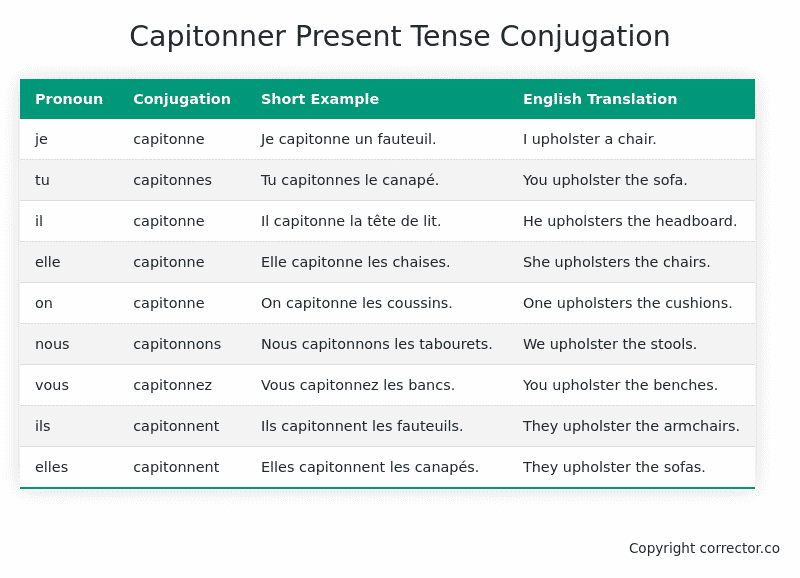Le Present (Present Tense) Conjugation of the French Verb capitonner
Introduction to the verb capitonner
The English translation of the French verb “capitonner” is “to upholster.” The infinitive form “capitonner” is pronounced as “ka-pee-ton-ay.”
“Capitonner” originates from the French word “capiton,” meaning “cushion.” It is most often used in everyday French to refer to the action of padding or lining furniture, typically with a layer of fabric or foam, in order to make it more comfortable.
Examples of its usage are as follows:
-
J’ai décidé de capitonner ma chaise pour plus de confort.
(I decided to upholster my chair for more comfort.) -
Le tapissier a capitonné le canapé avec un tissu élégant.
(The upholsterer upholstered the sofa with an elegant fabric.) -
Nous avons capitonné le matelas pour qu’il soit plus moelleux.
(We upholstered the mattress to make it softer.)
Please note that the translations provided are literal and may vary depending on the context.
Capitonner – About the French Present Tense
To take a deep dive into all the French tenses then see our article on Mastering French Tense Conjugation.
Common Everyday Usage Patterns For Le Present
Interactions with Other Tenses
Table of the Present Tense Conjugation of capitonner
| Pronoun | Conjugation | Short Example | English Translation |
|---|---|---|---|
| je | capitonne | Je capitonne un fauteuil. | I upholster a chair. |
| tu | capitonnes | Tu capitonnes le canapé. | You upholster the sofa. |
| il | capitonne | Il capitonne la tête de lit. | He upholsters the headboard. |
| elle | capitonne | Elle capitonne les chaises. | She upholsters the chairs. |
| on | capitonne | On capitonne les coussins. | One upholsters the cushions. |
| nous | capitonnons | Nous capitonnons les tabourets. | We upholster the stools. |
| vous | capitonnez | Vous capitonnez les bancs. | You upholster the benches. |
| ils | capitonnent | Ils capitonnent les fauteuils. | They upholster the armchairs. |
| elles | capitonnent | Elles capitonnent les canapés. | They upholster the sofas. |
Other Conjugations for Capitonner.
Le Present (Present Tense) Conjugation of the French Verb capitonner (You’re reading it right now!)
Imparfait (Imperfect) Tense Conjugation of the French Verb capitonner
Passé Simple (Simple Past) Tense Conjugation of the French Verb capitonner
Passé Composé (Present Perfect) Tense Conjugation of the French Verb capitonner
Futur Simple (Simple Future) Tense Conjugation of the French Verb capitonner
Futur Proche (Near Future) Tense Conjugation of the French Verb capitonner
Plus-que-parfait (Pluperfect) Tense Conjugation of the French Verb capitonner
Passé Antérieur (Past Anterior) Tense Conjugation of the French Verb capitonner
Futur Antérieur (Future Anterior) Tense Conjugation of the French Verb capitonner
Subjonctif Présent (Subjunctive Present) Tense Conjugation of the French Verb capitonner
Subjonctif Passé (Subjunctive Past) Tense Conjugation of the French Verb capitonner
Subjonctif Imparfait (Subjunctive Imperfect) Tense Conjugation of the French Verb capitonner
Subjonctif Plus-que-parfait (Subjunctive Pluperfect) Tense Conjugation of the French Verb capitonner
Conditionnel Présent (Conditional Present) Tense Conjugation of the French Verb capitonner
Conditionnel Passé (Conditional Past) Tense Conjugation of the French Verb capitonner
Conditionnel Passé II (Conditional Past II) Tense Conjugation of the French Verb capitonner
L’impératif Présent (Imperative Present) Tense Conjugation of the French Verb capitonner
L’impératif Passé (Imperative Past) Tense Conjugation of the French Verb capitonner
L’infinitif Présent (Infinitive Present) Tense Conjugation of the French Verb capitonner
L’infinitif Passé (Infinitive Past) Tense Conjugation of the French Verb capitonner
Le Participe Présent (Present Participle) Tense Conjugation of the French Verb capitonner
Le Participe Passé (Past Participle) Tense Conjugation of the French Verb capitonner
Struggling with French verbs or the language in general? Why not use our free French Grammar Checker – no registration required!
Get a FREE Download Study Sheet of this Conjugation 🔥
Simply right click the image below, click “save image” and get your free reference for the capitonner present tense conjugation!

I hope you enjoyed this article on the verb capitonner. Still in a learning mood? Check out another TOTALLY random French verb present conjugation!


